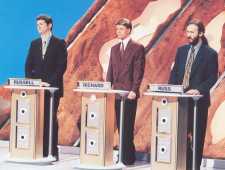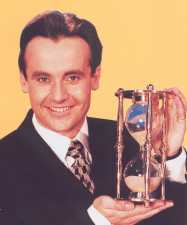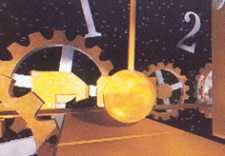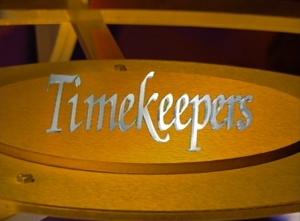Timekeepers
(→Web links) |
(→Synopsis) |
||
| (26 intermediate revisions not shown) | |||
| Line 1: | Line 1: | ||
| - | + | [[File:Timekeepers title.jpg|300px]] | |
| - | + | ||
<div class="box"> | <div class="box"> | ||
== Host == | == Host == | ||
| Line 8: | Line 7: | ||
== Broadcast == | == Broadcast == | ||
| - | Action Time for BBC1, 3 January 1995 to 2 February 1996 (73 episodes in 2 series) | + | Action Time and BBC North for BBC1, 3 January 1995 to 2 February 1996 (73 episodes in 2 series) |
</div> | </div> | ||
| Line 14: | Line 13: | ||
== Synopsis == | == Synopsis == | ||
| - | + | General knowledge quiz where the main gimmick of the show was that the three contestants' scores were time, and it was always a 5 minute clock, with 72 degrees per minute. Also, the clock hand made one revolution every time the players score changed, anti-clockwise when losing time and clockwise when gaining time. | |
| - | + | ||
| - | + | ||
<div class="image"><IMG src="/atoz/programmes/t/timekeepers/timekeepers 1.jpg" alt="timekeepers 1.jpg" width="225" height="170"> | <div class="image"><IMG src="/atoz/programmes/t/timekeepers/timekeepers 1.jpg" alt="timekeepers 1.jpg" width="225" height="170"> | ||
| Line 22: | Line 19: | ||
''A game of Timekeepers in action''</div> | ''A game of Timekeepers in action''</div> | ||
| - | The | + | First round questions were based on the participant's own hobbies, they each get to answer six questions and a total of 60 seconds to add to their time if they get all six correct, 10 seconds gets deducted if an incorrect answer is given. |
| - | + | ||
| - | + | The second round was basically the "dirty tricks" final round from [[Runway]] (another ''Action Time'' show, incidentally) where contestants get to answer 12 questions, buzzing in with the correct answer exempts them from answering the next question and deducts 10 seconds from their opponents time; however, buzz in with the incorrect answer and they are frozen out on the current question and lose 10 seconds. However, if no-one answers the question within the time, the contestant who was not exempt from answering that question doesn't lose anything, but their opponents lose 10 seconds. | |
| - | + | ||
| - | The | + | Round 3 involved a clock-based word game where each hour position on a 12-hour clock contained a different word and every answer is a combination of two words on the clock based on a clue that the contestants are given, but the contestants have to answer the question as the time where the combined two words are. There are two clock sets, each with six clues and six combinations with twelve words. Oh, and they have only a second to answer after they buzz in, otherwise adjudicators will regard it as a hesitation. |
| + | |||
| + | A quickfire game is played as the final round for the remainder amount of time for the contestants. Until the reminder of the time is up, contestants answer a series of questions on the buzzer and for each correct answer they buzz in, they take 10 seconds from one of their opponents' time and add it to theirs, an incorrect answer takes 10 seconds away from their score and if no-one answers a question after the timer, all three contestants lose 10 seconds. | ||
| + | |||
| + | After four rounds, the contestant that bagged the most amount of time goes through to the '''March Against Time''' where they have to answer 15 questions within 60 seconds without passing or getting an incorrect answer. The first 10 questions are worth 5 seconds while the last five are worth a whopping 10 seconds. This is where they could secure a place on the leader board to return for the play-offs and possibly the final. | ||
| + | |||
| + | ''Timekeepers'' is a near perfect lunchtime show, occupying the [[Going for Gold]] 1.50pm slot at the very start of 1995 with its clever clock-based word game that worked really well, if rather over-taxed the brain straight after lunch, an extremely rapid-fire end-game that unfortunately didn't make use of adding the time the winning contestant had previously "won" in the four rounds as well as on top of their end-game time, which is possibly a poor decision, and Dod's excellent firm-but-fair hosting - no adjudicators needed here, thank you very much. (And yes, it is Dod, not Dodd.) | ||
| + | |||
| + | <div class="image"><IMG src="/atoz/programmes/t/timekeepers/timekeepers 2.jpg" alt="timekeepers 2.jpg" width="187" height="225"> | ||
| + | |||
| + | ''Master of time - Bill Dod''</div> | ||
| + | |||
| + | ===Series 2=== | ||
| + | |||
| + | Later in the same year, a second series aired but this time in a later slot of 3.05pm just before Children's BBC programming. | ||
| + | |||
| + | A few changes were made for this series, the questions based on the contestants' hobbies from the first round were abolished and replaced by the clock-based word game from Round 3. This felt like a better start for the show as it gives viewers an idea of what's to come. | ||
| + | |||
| + | Round 2 remained unchanged, but Round 3 is where we get a harder version of Round 1 and that is each contestant is now going solo and are faced with a 24 hour clock with 24 words, each contestant has a different set and they get two minutes on the clock to answer six clues correctly, but they have to be careful because if they know they answer and they accidentally say 11 instead of 23, it's counted as an incorrect answer. After the contestant answered all six clues, the time that was left from their two minutes gets added to their time. The final round is also unchanged for the first series. | ||
| + | |||
| + | And yes, the contestant that scored the most amount of time gets to play the '''All-New March Against Time''' where its essentially the same as the end game from the first series but this time with a sand timer that contained 60 seconds of sand in the top part. The sand drained at one second per second, but a graphic of a bucket was placed above it. Each correct answer and the bucket tipped ten seconds of sand into the top of the timer. After 15 questions, the sand drain stopped and the sand still at the top was the player’s score for the leader board to...you know the drill. | ||
| + | |||
| + | The second series was actually an improvement over the first series, the pacing and flow of the show felt a lot more smoother and crisper, Bill Dod was still as firm and fair as host and funnily enough, the contestants' on-screen added time on their clocks was changed to just one dark blue colour, which is a bland downgrade compared to the first series colour-coded clocks of Red, Yellow and Light Blue. | ||
| + | |||
| + | And that was it! Two series of an underrated gem and it vanished in the blink of an eye, which is a shame because we definitely thought it had potential for a third series, but this was during a time when the Beeb was going through a huge amount of changes the following year and dismissed popular quizzes like [[Going for Gold]] and [[Turnabout (1)|Turnabout]] in favour of celebrity panel shows [[Call My Bluff]] and [[Through the Keyhole]]. | ||
| + | |||
| + | == Champions == | ||
| + | |||
| + | {| | ||
| + | |1995 | ||
| + | |''TBC'' | ||
| + | |- | ||
| + | |1995-96 | ||
| + | |Bob Thompson | ||
| + | |} | ||
== Catchphrases == | == Catchphrases == | ||
| Line 37: | Line 68: | ||
There was also "All lose ten!" when nobody buzzed in for a question, all three players had ten seconds deducted. Normally the question goes ‘dead’, but is this the only show where this happens? | There was also "All lose ten!" when nobody buzzed in for a question, all three players had ten seconds deducted. Normally the question goes ‘dead’, but is this the only show where this happens? | ||
| - | |||
| - | |||
| - | |||
| - | |||
| - | |||
| - | |||
| - | |||
| - | |||
== Inventor == | == Inventor == | ||
| Line 56: | Line 79: | ||
== Trivia == | == Trivia == | ||
| - | + | The star prize in the second series was an antique carriage clock, and during every episode, one of three or so inserts was aired of an antiques expert describing the timepiece to the viewers. | |
The title graphics for the show won an award at the Houston Worldfest - whatever that is. | The title graphics for the show won an award at the Houston Worldfest - whatever that is. | ||
| Line 68: | Line 91: | ||
[http://en.wikipedia.org/wiki/Timekeepers Wikipedia entry] | [http://en.wikipedia.org/wiki/Timekeepers Wikipedia entry] | ||
| - | + | [http://www.ravensbourne.ac.uk/bbc-motion-graphics-archive/timekeepers-1995 Opening titles from the BBC Motion Graphics Archive] | |
| - | + | ||
| - | + | ||
[[Category:General Knowledge Quiz]] | [[Category:General Knowledge Quiz]] | ||
[[Category:Action Time Productions]] | [[Category:Action Time Productions]] | ||
| + | [[Category:BBC North West Productions]] | ||
Current revision as of 07:49, 2 September 2024
Contents |
Host
Broadcast
Action Time and BBC North for BBC1, 3 January 1995 to 2 February 1996 (73 episodes in 2 series)
Synopsis
General knowledge quiz where the main gimmick of the show was that the three contestants' scores were time, and it was always a 5 minute clock, with 72 degrees per minute. Also, the clock hand made one revolution every time the players score changed, anti-clockwise when losing time and clockwise when gaining time.
 A game of Timekeepers in action
A game of Timekeepers in actionFirst round questions were based on the participant's own hobbies, they each get to answer six questions and a total of 60 seconds to add to their time if they get all six correct, 10 seconds gets deducted if an incorrect answer is given.
The second round was basically the "dirty tricks" final round from Runway (another Action Time show, incidentally) where contestants get to answer 12 questions, buzzing in with the correct answer exempts them from answering the next question and deducts 10 seconds from their opponents time; however, buzz in with the incorrect answer and they are frozen out on the current question and lose 10 seconds. However, if no-one answers the question within the time, the contestant who was not exempt from answering that question doesn't lose anything, but their opponents lose 10 seconds.
Round 3 involved a clock-based word game where each hour position on a 12-hour clock contained a different word and every answer is a combination of two words on the clock based on a clue that the contestants are given, but the contestants have to answer the question as the time where the combined two words are. There are two clock sets, each with six clues and six combinations with twelve words. Oh, and they have only a second to answer after they buzz in, otherwise adjudicators will regard it as a hesitation.
A quickfire game is played as the final round for the remainder amount of time for the contestants. Until the reminder of the time is up, contestants answer a series of questions on the buzzer and for each correct answer they buzz in, they take 10 seconds from one of their opponents' time and add it to theirs, an incorrect answer takes 10 seconds away from their score and if no-one answers a question after the timer, all three contestants lose 10 seconds.
After four rounds, the contestant that bagged the most amount of time goes through to the March Against Time where they have to answer 15 questions within 60 seconds without passing or getting an incorrect answer. The first 10 questions are worth 5 seconds while the last five are worth a whopping 10 seconds. This is where they could secure a place on the leader board to return for the play-offs and possibly the final.
Timekeepers is a near perfect lunchtime show, occupying the Going for Gold 1.50pm slot at the very start of 1995 with its clever clock-based word game that worked really well, if rather over-taxed the brain straight after lunch, an extremely rapid-fire end-game that unfortunately didn't make use of adding the time the winning contestant had previously "won" in the four rounds as well as on top of their end-game time, which is possibly a poor decision, and Dod's excellent firm-but-fair hosting - no adjudicators needed here, thank you very much. (And yes, it is Dod, not Dodd.)
 Master of time - Bill Dod
Master of time - Bill DodSeries 2
Later in the same year, a second series aired but this time in a later slot of 3.05pm just before Children's BBC programming.
A few changes were made for this series, the questions based on the contestants' hobbies from the first round were abolished and replaced by the clock-based word game from Round 3. This felt like a better start for the show as it gives viewers an idea of what's to come.
Round 2 remained unchanged, but Round 3 is where we get a harder version of Round 1 and that is each contestant is now going solo and are faced with a 24 hour clock with 24 words, each contestant has a different set and they get two minutes on the clock to answer six clues correctly, but they have to be careful because if they know they answer and they accidentally say 11 instead of 23, it's counted as an incorrect answer. After the contestant answered all six clues, the time that was left from their two minutes gets added to their time. The final round is also unchanged for the first series.
And yes, the contestant that scored the most amount of time gets to play the All-New March Against Time where its essentially the same as the end game from the first series but this time with a sand timer that contained 60 seconds of sand in the top part. The sand drained at one second per second, but a graphic of a bucket was placed above it. Each correct answer and the bucket tipped ten seconds of sand into the top of the timer. After 15 questions, the sand drain stopped and the sand still at the top was the player’s score for the leader board to...you know the drill.
The second series was actually an improvement over the first series, the pacing and flow of the show felt a lot more smoother and crisper, Bill Dod was still as firm and fair as host and funnily enough, the contestants' on-screen added time on their clocks was changed to just one dark blue colour, which is a bland downgrade compared to the first series colour-coded clocks of Red, Yellow and Light Blue.
And that was it! Two series of an underrated gem and it vanished in the blink of an eye, which is a shame because we definitely thought it had potential for a third series, but this was during a time when the Beeb was going through a huge amount of changes the following year and dismissed popular quizzes like Going for Gold and Turnabout in favour of celebrity panel shows Call My Bluff and Through the Keyhole.
Champions
| 1995 | TBC |
| 1995-96 | Bob Thompson |
Catchphrases
(After the contestants had introduced themselves): "They're my three Timekeepers!" (Dod obviously liked to personalise wherever possible).
"Each correct answer earns ten seconds... not from me, but from one of your opponents." That was the prize for a correct answer in the quick-fire finale.
Also instead of "correct", Bill always said "Ten from?" as a prompt to nominate an opponent to steal time from.
There was also "All lose ten!" when nobody buzzed in for a question, all three players had ten seconds deducted. Normally the question goes ‘dead’, but is this the only show where this happens?
Inventor
Stephen Leahy and Toby Freeman
Theme music
Simon Etchell
Trivia
The star prize in the second series was an antique carriage clock, and during every episode, one of three or so inserts was aired of an antiques expert describing the timepiece to the viewers.
The title graphics for the show won an award at the Houston Worldfest - whatever that is.
 Screenshot from the opening titles
Screenshot from the opening titlesWeb links
Opening titles from the BBC Motion Graphics Archive


